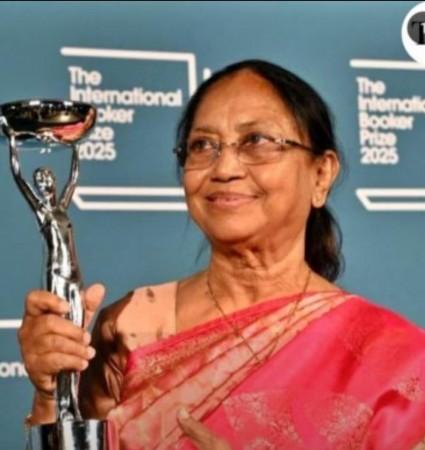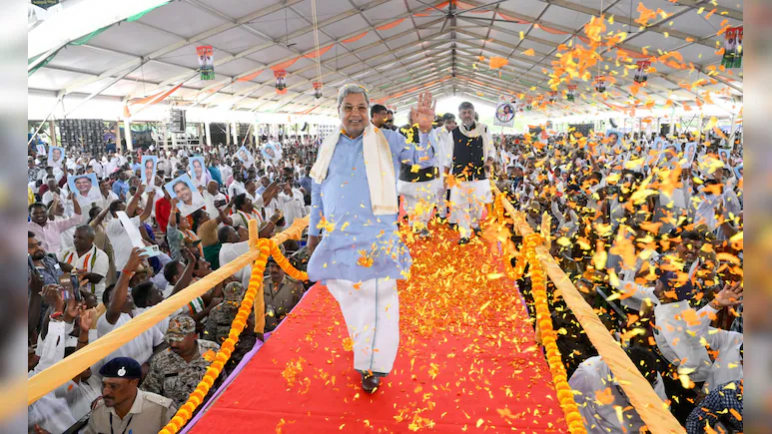
In Karnataka, a significant political debate has emerged over the decision to invite Booker Prize winner Banu Mushtaq to inaugurate the Dussehra festivities in Mysuru. This decision has sparked a clash between the Bharatiya Janata Party (BJP) and the Congress-led state government, highlighting the intersection of culture, religion, and politics in the region.
BJP has raised concerns about whether Banu Mushtaq, an acclaimed author, would embrace Hindu culture, traditions, and practices, which are integral to the Dussehra celebrations. BJP state president and MLA B.Y. Vijayendra expressed these concerns during a media interaction at the BJP state office, Jagannath Bhavan.
He stated, "If Banu Mushtaq accepts our Hindu culture, traditions, and practices and shows faith in them, we will welcome her." This statement underscores the BJP's apprehension about Mushtaq's suitability for the role, given the religious significance of the event.
Vijayendra further suggested that the state government should have considered inviting Deepa Bhasthi, a translator from Kodagu who, along with Mushtaq, received the International Booker Prize. He questioned the government's interest in Kodagu, implying that Bhasthi's inclusion would have been more appropriate.
"In such matters, Deepa Bhasthi could have been paired with Banu Mushtaq," he remarked, emphasizing the potential for a more inclusive approach. The controversy has drawn reactions from various political figures. Karnataka Home Minister G. Parameshwara defended the government's decision, pointing out that similar precedents exist.
He cited the example of Nisar Ahmad, who had previously inaugurated the Dussehra festivities, and Sir Mirza Ismail, who served as the Diwan of Mysuru.

Parameshwara argued that the festival is a celebration of the land, not confined to religious or caste boundaries. He questioned the BJP's stance, asking, "Why are you bringing religious matters into this? Will you celebrate the festival by keeping one section of society out?"
BJP's concerns extend to Mushtaq's personal beliefs, particularly regarding her faith in Goddess Chamundeshwari, a central figure in the Dussehra celebrations. Former minister and BJP MLC CT Ravi argued that it was inappropriate for someone "whose faith is uncertain" to lead a religious ceremony.
Similarly, former Mysuru MP Pratap Simha expressed respect for Mushtaq's achievements but suggested that she should preside over literary events rather than Dussehra, which begins with a pooja to Goddess Chamundeshwari. He questioned, "Does she have faith in Chamundeshwari Devi? Is she following our traditions?"
Expelled BJP MLA Basanagouda Patil Yatnal echoed these sentiments, stating that Mushtaq's participation in the religious inauguration could conflict with her own religious beliefs. He emphasized the need for clarity on whether she continues to follow Islam or aligns with Hindu traditions.
Yatnal suggested that Mushtaq could participate in cultural or literary events within the Dussehra festivities but should refrain from the religious inauguration itself. BJP MP Tejasvi Surya offered a slightly different perspective, stating, "I don't have an objection to anybody. But Mysuru Dasara is an important religious festival of Karnataka, and we only expect that whoever inaugurates it and offers the first prayers should make their belief in Goddess Chamundeshwari public and clear."
In response to the BJP's objections, Karnataka Home Minister G. Parameshwara reiterated that the issue is not religious but cultural. He emphasized that Dasara is a national festival, celebrated as the Nada Habba (state festival) of Karnataka.
Chief Minister Siddaramaiah had announced Mushtaq's name to inaugurate the celebrations, which traditionally begin with rituals at the Chamundi Hill temple.
Mysuru Dasara, known as the Royal Festival, symbolizes the triumph of good over evil and is celebrated for ten days, culminating in Vijayadashami. The festival includes rituals dedicated to deities such as Saraswati, Durga, and Lakshmi, and features a grand procession from Mysuru Palace to Bannimantap. The event is led by the Mysuru royal family, who uphold centuries-old traditions and pujas.

















